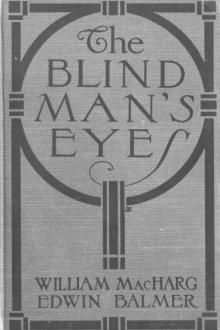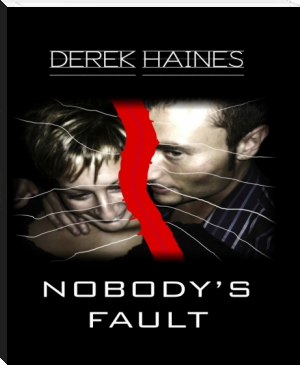The Blind Man's Eyes by William MacHarg (best books to read non fiction txt) 📕

- Author: William MacHarg
- Performer: -
Book online «The Blind Man's Eyes by William MacHarg (best books to read non fiction txt) 📕». Author William MacHarg
The man, continuing to flash his light about, plainly had heard nothing, and the curtains had prevented him from being warned by the chill of the night air that the window was open; but now, at the further side of the room, another electric torch flashed out. Another man had been in the room; he neither alarmed nor was alarmed by the man flashing the first light; each had known the other's presence before. There were at least two men in the room, working together—or rather, one was working, the other supervising; for Eaton heard now a steady, almost inaudible grinding noise as the second man worked. Eaton halted again and waited; if there were two, there might be others.
The discovery of the second man had not made Eaton afraid; his pulses were beating faster and hotter, and he felt the blood rushing to his head and his hands growing cold with his excitement; but he was conscious of no fear. He crouched and crept forward noiselessly again. No other light appeared in the room, and there was no sound elsewhere from the darkness; but the man who supervised had moved closer to the other. The grinding noise had stopped; it was followed by a sharp click; the men, side by side, were bending over something; and the light of the man who had been working, for a fraction of a second shot into the face of the other. It did not delay at all; it was a purely accidental flash and could not have been said to show the features at all—only a posture, an expression, a personality of a strong and cruel man. He muttered some short, hoarse imprecation at the other; but before Eaton heard the voice, he had stopped as if struck, and his breath had gone from him.
His instant's glimpse of that face astounded, stunned, stupefied him. He could not have seen that man! The fact was impossible! He must have been mad; his mind must have become unreliable to let him even imagine it. Then came the sound of the voice—the voice of the man whose face he had seen! It was he! And, in place of the paralysis of the first instant, now a wild, savage throe of passion seized Eaton; his pulses leaped so it seemed they must burst his veins, and he gulped and choked. He had not filled in with insane fancy the features of the man whom he had seen; the voice witnessed too that the man in the dark by the wall was he whom Eaton—if he could have dreamed such a fact as now had been disclosed—would have circled the world to catch and destroy; yet now with the destruction of that man in his power—for he had but to aim and empty his automatic pistol at five paces—such destruction at this moment could not suffice; mere shooting that man would be petty, ineffectual. Eaton's fingers tightened on the handle of his pistol, but he held it now not as a weapon to fire but as a dull weight with which to strike. The grip of his left hand clamped onto the short steel bar, and with lips parted—breathing once, it seemed, for each heartbeat and yet choking, suffocating—he leaped forward.
At the same instant—so that he could not have been alarmed by Eaton's leap—the man who had been working moved his torch, and the light fell upon Eaton.
"Look out!" the man cried in alarm to his companion; with the word the light of the torch vanished.
The man toward whom Eaton rushed did not have time to switch off his light; he dropped it instead; and as Eaton sprang for him, he crouched. Eaton, as he struck forward, found nothing; but below his knees, Eaton felt a man's powerful arms tackling him; as he struggled to free himself, a swift, savage lunge lifted him from his feet; he was thrown and hurled backwards.
Eaton ducked his head forward and struggled to turn, as he went down, so that a shoulder and not his head or back would strike the floor first. He succeeded in this, though in his effort he dropped the jimmy. He clung with his right hand to the pistol, and as he struck the floor, the pistol shot off; the flash of flame spurted toward the ceiling. Instantly the grip below his knees was loosed; the man who had tackled him and hurled him back had recoiled in the darkness. Eaton got to his feet but crouched and crept about behind a table, aiming his pistol over it in the direction in which he supposed the other men must be. The sound of the shot had ceased to roar through the room; the gases from the powder only made the air heavier. The other two men in the room also waited, invisible and silent. The only light, in the great curtained room, came from the single electric torch lying on the floor. This lighted the legs of a chair, a corner of a desk and a circle of books in the cases on the wall. As Eaton's eyes became more accustomed to the darkness, he could see vague shapes of furniture. If a man moved, he might be made out; but if he stayed still, probably he would remain indistinguishable.
The other men seemed also to have recognized this; no one moved in the room, and there was complete silence.
Eaton knelt on one knee behind his table; now he was wildly, exultantly excited; his blood leaped hotly to his hand pointing his pistol; he panted, almost audibly, for breath, but though his pulse throbbed through his head too, his mind was clear and cool as he reckoned his situation and his chances. He had crossed the Pacific, the Continent, he had schemed and risked everything with the mere hope of getting into this room to discover evidence with which to demand from the world righting of the wrong which had driven him as a fugitive for five years; and here he found the man who was the cause of it all, before him in the same room a few paces away in the dark!
For it was impossible that this was not that man; and Eaton knew now that this was he who must have been behind and arranging and directing the attacks upon him, Eaton had not only seen him and heard his voice, but he had felt his grasp; that sudden, instinctive crouch before a charge, and the savage lunge and tackle were the instant, natural acts of an old linesman on a championship team in the game of football as it was played twenty years before. That lift of the opponent off his feet and the heavy lunge hurling him back to fall on his head was what one man—in the rougher, more cruel days of the college game—had been famous for. On the football field that throw sufficed to knock a helmeted opponent unconscious; here it was meant, beyond doubt, to do more.
Upon so much, at least, Eaton's mind at once was clear; here was his enemy whom he must destroy if he himself were not first destroyed. Other thoughts, recasting of other relations altered or overturned in their bearing by the discovery of this man here—everything else could and must wait upon the mighty demand of that moment upon Eaton to destroy this enemy now or be himself destroyed.
Eaton shook in his passion; yet coolly he now realized that his left shoulder, which had taken the shock of his fall, was numb. He shifted his pistol to cover a vague form which had seemed to move; but, if it had stirred, it was still again now. Eaton strained to listen.
It seemed certain that the noise of the shot, if not the sound of the struggle which preceded it, must have raised an alarm, though the room was in a wing and shut off by double doors from the main part of the house; it was possible that the noise had not gone far; but it must have been heard in the room directly above and connected with the study by a staircase at the head of which was a door. Basil Santoine, as Eaton knew, slept above; a nurse must be waiting on duty somewhere near. Eaton had seen the row of buttons which the blind man had within arm's-length with which he must be able to summon every servant in the house. So it could not last much longer now—this deadlock in the dark—the two facing one, and none of them daring to move. And one of the two, at least, seemed to have recognized that.
Eaton had moved, warily and carefully, but he had moved; a revolver flashed before him. Instantly and without consciousness that his finger pulled the trigger, Eaton's pistol flashed back. In front of him, the flame flashed again, and another spurt of fire spat at one side.
Eaton fired back at this—he was prostrate on the floor now, and whether he had been hit or not he did not yet know, or whether the blood flowing down his face was only from a splinter sprayed from the table behind which he had hid. He fired again, holding his pistol far out to one side to confuse the aim of the others; he thought that they too were doing the same and allowed for it in his aim. He pulled his trigger a ninth time—he had not counted his shots, but he knew he had had seven cartridges in the magazine and one in the barrel—and the pistol clicked without discharging. He rolled over further away from the spot where he had last fired and pulled an extra clip of cartridges from his pocket.
The blood was flowing hot over his face. He made no effort to staunch it or even to feel with his fingers to find exactly where or how badly he had been hit. He jerked the empty cartridge clip from his pistol butt and snapped in the other. He swept his sleeve over his face to clear the blood from his brows and eyes and stared through the dark with pistol at arm's-length loaded and ready. Blood spurted over his face again; another sweep of his sleeve cleared it; and he moved his pistol-point back and forth in the dark. The flash of the firing from the other two revolvers had stopped; the roar of the shots had ceased to deafen. Eaton had not counted the shots at him any better than he had kept track of his own firing; but he knew now that the other two must have emptied their magazines as well as he. It was possible, of course, that he had killed one of them or wounded one mortally; but he had no way to know that. He could hear the click as one of the men snapped his revolver shut again after reloading; then another click came. Both the others had reloaded.
"All right?" the voice which Eaton knew questioned the other.
"All right," came the reply.
But, if they were all right, they made no offer to fire first again. Nor yet did they dare to move. Eaton knew they lay on the floor like





Comments (0)